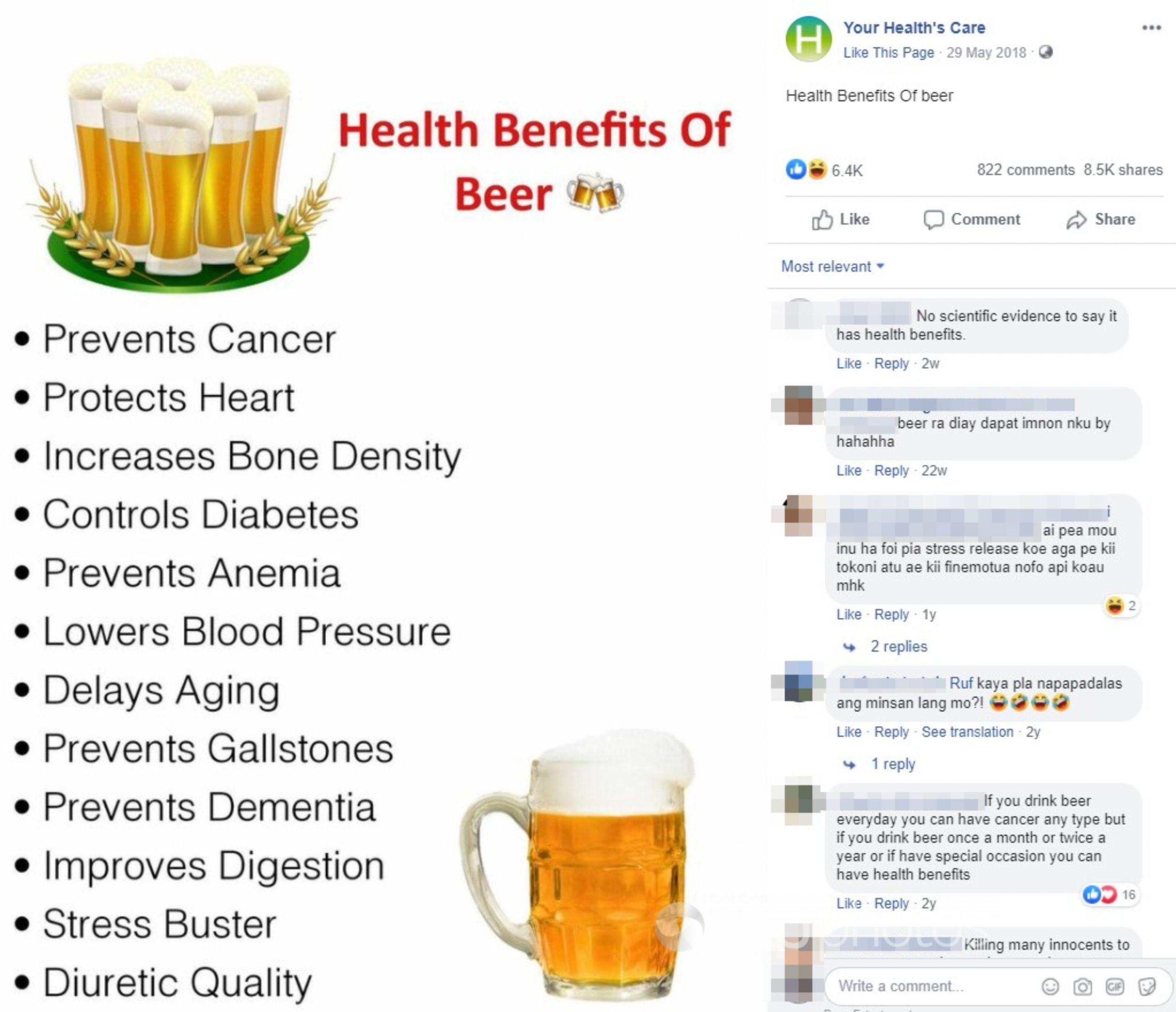The Statement
A Facebook post claims drinking beer provides a range of health benefits – including preventing cancer.
The image-based post is titled “Health Benefits of Beer” and features a list of positive health effects supposedly brought on by enjoying the amber liquid. These include improved bone density and digestion, as well as the prevention of cancer, diabetes, gallstones and dementia.
At the time of writing, the May 2018 post from an India-managed page had been shared more than 8,500 times and received more than 6,400 reactions and 800 comments. It has been shared by several users in Fiji, among those from other countries.

The Analysis
While ale aficionados may welcome beer being declared the next superfood, many of the benefits listed in the Facebook post are overstated, while others are false or subject to conflicting medical evidence.
AAP FactCheck examined some of the post’s most dubious health claims.
Does beer prevent cancer? Not according to the United States Centers for Disease Control and Prevention (CDC), which advises: “The less alcohol you drink, the lower your risk for cancer.”
It goes on to state that “drinking any kind of alcohol can contribute to cancers of the mouth and throat, larynx, esophagus, colon, rectum, liver, and breast (in women)”.
The American Cancer Society also says alcohol consumption is linked to multiple types of cancers, and advises that “the more alcohol you drink, the higher your cancer risk”.
A 2015 paper published by the Australian and New Zealand Journal of Public Health estimated 3,208 cancer cases occurring in Australian adults in 2010 could be attributed to alcohol consumption. That was 2.8 per cent of the national total for all cancers in the year.
In a 2017 editorial, The Lancet medical journal noted: “Historical assertions of benefit from alcohol are likely misinterpreted or exaggerated, because no lower threshold for cancer risk has yet been identified.”
The editorial goes on to detail the carcinogenic danger posed by alcohol, describing the scale of the problem as “immense”.
“For example, a three times increase in the recommended alcohol limit raises the risk of oesophageal cancer eight times, leading to estimates that three-quarters of oesophageal cancers are due to high alcohol consumption. Because cancer of the oesophagus has a five-year survival rate of less than 10 per cent, prevention is paramount.”
For the claim that beer protects the heart, the answer is not clear and depends heavily on the amount of alcohol consumed, according to Harvard Medical School.
A 2018 Harvard Health Publishing article said existing research was conflicting, with some studies saying alcohol improved heart health while others implied the opposite
It quotes Michael Gaziano, a professor of medicine at Harvard Medical School, as saying that no large-scale trials had provided a clear causal link between alcohol consumption and heart health benefits.
“Therefore, you can’t say for certain whether alcohol plays an essential role in reducing common heart disease risk factors like high cholesterol levels and high blood pressure,” he said.
NUI Galway cardiology professor Bill McEvoy offered a similar assessment in an article published by Johns Hopkins Medicine.
On the claim that beer improves bone density, Ian Reid, a professor of medicine at the University of Auckland and a leading figure in bone research, told AAP FactCheck that “there is some evidence that older women who have a low to moderate alcohol intake have better bone densities than those who drink nothing”.
“However, more than two drinks per day is associated with an increased risk of fractures,” Prof Reid said. “No one would advocate drinking beer as a way of reducing fracture risk.”
Regarding the claim beer prevents anaemia, a 2004 study by the American Gastroenterology Association linked alcohol consumption with a decrease in iron-deficiency anaemia.
The study of 20,511 people concluded that “consumption of any amount of alcohol was associated with a reduction in the risk of iron deficiency and iron deficiency anaemia in the US population”.
However, Elaine Rush, a professor of nutrition at Auckland University of Technology and scientific director of the New Zealand Nutrition Foundation, said the benefits identified in the study may be overstated.
“Association does not mean cause and effect,” Prof Rush told AAP FactCheck in an email. “You can’t just suddenly start consuming a lot of beer and expect any sort of benefits just from that one product.”
Alcohol consumption has also been linked to accelerating – rather than delaying – ageing, according to a 2017 study published in the British Medical Journal.
The Danish study of 11,600 adults investigated whether alcohol and smoking are associated with four visible age-related sign. It noted that “looking old for one’s age is associated with poor health, cardiovascular disease and early death”.
It found that “high alcohol consumption and smoking predict development of visible age-related signs”, although it also noted that low-to-moderate alcohol intake had been linked to lower all-cause mortality in previous studies.
A fact sheet from the US National Institute on Aging lists a host of health conditions – including cancer, liver damage, immune system disorders, brain damage, diabetes and high blood pressure – which either develop or worsen by drinking too much alcohol over a long period.
There is also some research to show that heavy drinking can increase the risk of developing dementia. A 2018 French study that examined data for more than a million adults with dementia found that alcohol dependence was the “strongest modifiable risk factor for dementia onset”.
The Verdict
Beer may have some health benefits such as reducing anaemia, however many of the post’s claims – such as that it prevents cancer and dementia, and delays ageing – are either false or misleading, studies show.
There is also mixed evidence that beer protects the heart, while the claim that beer increases bone density is flawed, experts say.
Partly False – Content that has some factual inaccuracies.
* AAP FactCheck is an accredited member of the International Fact-Checking Network. If you would like to support our independent, fact-based journalism, you can make a contribution to AAP here.
All information, text and images included on the AAP Websites is for personal use only and may not be re-written, copied, re-sold or re-distributed, framed, linked, shared onto social media or otherwise used whether for compensation of any kind or not, unless you have the prior written permission of AAP. For more information, please refer to our standard terms and conditions.


















